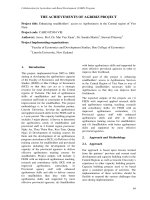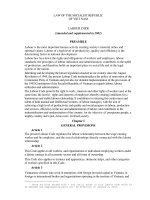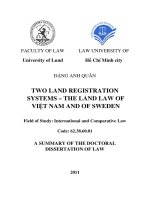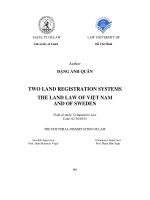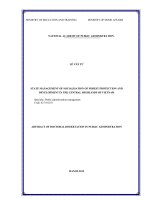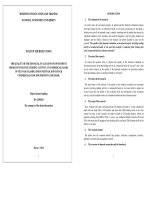EDUCATING STUDENTS KEEP READING THE FOLK TALES OF VIET NAM THROUGH INTERGRATED TEACHING PERIOD 43 “ UNIT 6 a CLOSER LOOK 1 – ENGLISH 8”
Bạn đang xem bản rút gọn của tài liệu. Xem và tải ngay bản đầy đủ của tài liệu tại đây (1.08 MB, 17 trang )
A. INTRODUCTION
I. THE REASON:
The world is changing faster and faster in the early 21 st century in our
everyday life. For this reason, the Vietnamese people have to be ware of
improving the knowledge and social skills in order to change a developing
country into a developed country in the fastest way and we can afford our
modern life.
As you know, English is an international language. It is spoken in many
corners in the world. It is not only the first language of many countries but also
the compulsory subject in the schools in all countries in the world. So, it is
becoming more and more important in modern life. In addition, communication
is the key to our modern life and it makes the world a small village.A good
command of English and great success gained in putting English in action
definitely enable you to improve your own status and position in the eye of
international friends. In order to know how to use modern technology and
inventions of the world is very important. Therefore, English is the key of the
economic policy of each country.For the businessmen circle, English is regarded
as the tactic for every potential achievement.
However, it is the fact that once learning approach has been mix-executed,
we probably face bigger challenges in achieving planned goals as a result. As a
rule, teaching and learning English are interrelated. In setting of further global
integration, the Vietnamese education has been changing basically and the
teachers are very important volunteers . They play the role as the guider for
students during their English acquisition. In the spirit, teacher’s traditional
function, known as pure teaching performance, should be taken into
consideration.
There is a demand in integrated teaching approaches in which social or
natural science subjects (Literature, Fine arts, Biology, Geography, Civic
education are integrated into one subject. Base on it, students are taught how to
perform information, collection, processing and assessment, thereby well
applying acquired knowledge to their real situations of daily life.
Integrated teaching can be performed in the scope of one unit, one theme,
or one certain period in class. In the period of this initiative experience, I have
made most use of inter-subject knowledge acquired in order to enable students
to well deal with improving their knowledge about folk tales, help them to keep
1
the habit of reading Vietnamese folk tales. Therefore, the performance of the
topic of study on the Period 43 UNIT6: FOLK TALES - Lesson 2: CLOSER
LOOK 1 (ENGLISH 8) is in need of inter-subject teaching involved in subjects
as follows:
* Biology: Educating students not only keep effectively wild animals but
also understand the importance of them. (Periods: 60, 61, 62, 63, 64 –
Chapter- the environment – Biology class 9).
* Literature: Students use their literature knowledge to propaganda their
classmates or school-mates understand more about folk tales of Viet Nam .
Moreover, They use languages to propaganda everyone reading them..
* Fine arts: Guiding students draw some pictures about characters in folk
tales and decorate banners to propaganda people about the importance of them.
Being a teacher in the current situation, I am well aware of greater
significance of integrated teaching approaches in dealing with potential
problems in each subject, facilitating students to have further understanding of
every aspects of the subject involved. Integrated teaching helps students bring
into full play their own thinking and creativity in knowledge acquisition and
application in reality. In the sprit. I would like to express certain experiences in
integrated teaching in the topic: “ Educating students keep reading the folk
tales of Viet Nam through integrated teaching period 43 th – Unit 6: A Closer
Look 1 -English 8”
II. THE PURPOSE
With this aspect of studying how to Educating students keep reading the folk
tales of Viet Nam through integrated teaching period, I’d like to share my
little experience innovation with you that will help students to not only know
more about the language, but also widen their knowledge about folk tales of our
country.
III. OBJECT AND SCOPE OF THE STUDYING
1 OBJECT OF STUDY.
Objective of study includes twenty-eight students of class 8A at Dong
Minh Secondary School, Dong Son District, Thanh Hoa Province.
2. SCOPE OF STUDY.
School year: 2018- 2019
2
IV. RESEARCH METHOD
Reading and learning about English materials related to teaching English.
Investigating, surveying the learning situation of English students. From then,
applying that methods to produce the most objective results.
B. CONTENT
I. THEORETICAL BACKGROUND.
In the current process of national industrialization and modernization, further
international integration is of greater significance. In the spirit, our State and
Party have reaffirmed the policy “Education is National Top Priority”, English
has been paid more and more attention and listed in the compulsory educational
curriculum
In fact, English is open to all learners at any level, but it requires
reasonable learning approaches and know- haws for truly great effectiveness, In
other words, how to learn English well is an issue of much interest.
About all, Learning English requires all learners to make ultimate selfmotivation, which drive them to be patient determining specific goals within a
certain period of time. What is learning English for? Just be well aware of
individual goals, like foreign business communication, abroad traveling,
tourism, or overseas learning, and so on ... Once specific goals have been set and
determined, best learning English approaches are probably found out. The same
can be said about English teachers. Thus, integrated teaching should be soon
taken into consideration, mostly because it enables students to precisely acquire
knowledge, skills and positive attitudes, at the same time integrating all of them
into real social situations, as well as inspiring them to learn English and lead
meaningful lives.
II. PRACTICAL BACKGROUND.
Teaching and learning English at Dong Minh Secondary School are facing a
great number of issues, caused by certain things as follows:
1. STUDENTS AND THEIR PARENTS.
A certain number of students and their parents are not clearly aware of
English significance. As the result, students take little interest in learning
English, while their parents pay no attention to their children’s performance at
school.
3
A contingent of students take no notice of their lessons due to chatting;
inattention in teachers’ performance, as well as distraction caused by outersocial factors like online games, social networks and teenager tendencies ...etc.
Also, students generally show signs of laziness and poor awareness of selfstudy. They frequently forget to review lessons, do homework and make
preparations for new classes. In addition, they fail to balance their interests in
their life. Many students have lost their English background, that is proven via
the outcome of school year beginning placement test.
2. TEACHERS.
Regardless of numerous efforts made during their lessons, namely diversified
teaching approaches aimed at further students mobilization, eventual result are
to some extent limited. Teachers fall to apply their favorite teaching approaches
to all lessons. It is partly because of overloaded course book content, over-sized
classes, poor student background, and poor awareness of self-improvement. As
the result, teaching English outcome has failed to meet the demands up to now.
3. ENGLISH CURRICULUM.
In spite of its further attraction in content, the English curriculum, in fact, is
much more difficult, therefore, acts as a huge challenge to students of poor
background. Apart from it, English is in close connection with other subjects in
the over-all curriculum at secondary school level. Thus, it requires learners a
certain level of background which ensures them a relatively performance at
school. In reality, a lot of students fail to keep face with the curriculum and
eventually are left behind.
III. THE SOLUTION
1. INTEGRATED TEACHING WITH SUBJECTS.
In some cases, the allocation of English content in each period is to some
extent uneven. Some English content can not be dealt with in just forty five
minutes as scheduled, time for further practice of grammar points is in fact
limited, teachers are forced and raven to adjust their own teaching approaches
that are much more in line with such new situation. At the same time, new goals
are set, as the result, one of new teaching approaches is taken into consideration
in my topic, namely English- Biology- literature- Fine Art- Civic Education
integrated teaching. It is as follows:
*ENGLISH:
Teaching vocabularies about “FOLK TALES”, Introducing some model
sentences and structures in the lesson and things students should or shouldn’t do
to keep available folk tales of Viet Nam. Giving the pictures about the folk tales
and good and bad characters (Textbook English 8- page 60)
* BIOLOGY:
4
Educating students not only keep effectively wild animals but also
understand the importance of them. (Periods: 60, 61, 62, 63, 64 – Chapter- the
environment – Biology class 9).
* LITERATURE:
Students use their literature knowledge to propaganda their classmates or
school-mates understand more about folk tales of Viet Nam . Moreover, They
use languages to propaganda everyone reading them.
* FINE ART:
Guiding students draw some pictures about characters in folk tales and
decorate banners to propaganda people about the importance of them.
2. PROCESS OF INTEGRATED TEACHING
1. WARM-UP:
Brainstorming:
Teacher divide students into six groups and asks them to write some folk
tales.
"Hoang Tu Coc”
“Qua bau tien”
“Cay tre tram dot”
Folk tales
“So Dua”
“Thanh Giong”
“Son Tinh Thuy Tinh”
Students work in group and write some folk tales
Teacher asks the volunteer of each group to say their answers before the
class.
Teacher asks others to give their opinion, then teacher ticks the folk tales
and gives marks to each group.
2. PRESENTATION:
*VOCABULARY
- Teacher gives some pictures, asks students to look at them and introduce
5
quickly some new words about the FOLK TALES : woodcutter, emperor, knight,
giant, with, hare, ogre, eagle, greedy, evil, cunning, wicked.
- Teacher asks students to repeat in chorus and individual.
* CHECKING UP VOCABULARY:
-Teacher divides students into two teams and orders students to do activity
1 (on page 60- match the characters with the pictures) by playing game: Quick
eyes quick hands.
A.
woodcutter
E.fairy
1
B.emperor
F.princess
2
C.Buddha
G.giant
3
D.knight
H.witch
4
5
6
7
8
Teacher choose four students in each team to stick words in the correct pictures,
Team finishes first that is winner.
* Teacher gives feedback & marks for teams and asks students to check their
answers.
1-G
2-C
3- E
4-B
5-H
6-A
7-D
8-F
- Students check the answers and write down.
Students play game: Quick eyes quick hands
6
3. PRACTICE:
2- Match the creatures with the pictures.(page 60 - text book -English 8)
A.dragon B.wolf C.hare D.fox E.tortoise F.lion G.ogre H.eagle
1..
2..
3…
4…
5...
6...
7…
8…
*Teacher divides students into six groups.
- Students sits into six groups .
*Teacher asks students to match the characters with the pictures (on page 60).
- Students work in group and match the characters with the pictures
Teacher guides students to do activity 2 (page 60)
* Teacher asks the volunteer to give the answer.
- Students give the answers
* Teacher give feedback and asks students to check their answers
1-G
2-F
3- A
4-E
5-B
6-C
7-H
8-D
- Students check the answers and write down
3a. The adjectives in the box are often used to describe characters in folk
tales. Put them into the correct columns.( page 60 - text book )
cheerful
generous
evil
cruel
cunning
fierce
brave
kind
mean
wicked
greedy
intelligent
positive
negative
……………………………………… ……………………….…………….
………………………………………
……………………………………
* Teacher asks students to work in pair and write the adjectives in the correct
column.
- Students work in pair and write the adjectives in the correct column.
7
*Teacher calls 2 students to write their answers on the board.
- Students write their answers on the board
* Teacher give feedback and asks students to check their answers
Positive: cheerful, brave, generous, kind, intelligent
Negative: cruel, cunning, mean, evil, greedy, wicked, fierce
- Students check the answers and write down
4. Listen and repeat the sentences ( page 60 - text book)
Paying attention to intonation.
1. What a colourful hat she is wearing!
2. What a time we’re had today!
3. What beautiful eyes she has!
4. What a nice day it is!
5. What good news it is!
*Teacher plays the cassette and the tape; asks students to pay attention to
intonation of exclamatory sentences.
REMEMBER:
We use falling intonation for exclamatory centences
5. Practice these sentences. Then listen and repeat ( page 60 - text book)
1. What a beautiful princess she is!
2. What brave knights they are!
3. What a big nose the wolf has!
4. What a fierce ogre it is!
5.What a handsome prince he is !
*Teacher plays the cassette and the tape; asks students to pay attention to
intonation of exclamatory sentences.
*Teacher asks students to repeat.
4. CONSOLIDATION:
4-1. Teacher review the lesson by asking students to do activity 3b (page 60)
3b. Now use these adjectives to describe some characters in one of your
favorite folk tales.
Example: There’s a wolf in a little Red Riding Hood. He’s cunning and wicked.
* Teacher asks students to work individual and write their answer on the board.
Suggestion: There is a fairy in Tam Cam . She is kind and helpful
Tam’s stepmother is very cruel.
4-2. Integrated another subjects
+ Geography and Biology: Say the names of animals?
Suggestion:( deer, crocodile, whale, elephant, turtle, zebra horse, lion,
leopard)
+ Music: Sing some songs Which has mentioned the animals ?
(Students sing a song which mentions animals. For example the song “Cham
nhu rua”(slow as the turtle))
+ Literature: Say the characters in folk tale : “Con Rong Chau Tien”?
Suggestion: (Lac Long Quan is a talent and brave King. He educated his fifty
sons to catch fish and protect our sea of Viet Nam . Au Co is a hard-working
woman. She and her sons and people grow vegetables, raise the cattle… )
8
4-3.TEST FOR 5 MINUTES:
DONG SON EDUCATION ANDTRAINING DEPARTUREMENT
ENGLISH TEST
Allowed Time: 5 minutes
DONG MINH SECONDARY SCHOOL
Full name: ...................................................................... class: 8......................
Mark
Teacher’s Remarks.
TITLE AND TASK
Match the characters of the pictures and adjectives to describe them
knight
lion
princess
witch
giant
woodcutter
cruel
brave
kind
hard-working
fat
fierce
1.............................................................. 2.........................................................
3............................................................
4………………………………………
9
5........................................................... 6...............................................................
5. HOMEWORK
1. Learn by heart vocabulary: : woodcutter, emperor, knight, giant, with, hare,
ogre, eagle, greedy, evil, cunning, wicked, fierce.
2. Prepare new lesson: Unit 6- A Closer Look 2
10
IV. TEACHING PROCESS:
STEPS
CONTENT
TEACHER’S ACTIVITIES
INTERA
-CTION
* Asks students to work in
Work in groups write folk tales. GroupWarm-up Discussing and writing: write
The volunteer of each group to work
some folk tales.
groups to write folk tales.
(5.m)
*Teacher asks the volunteer of say their answers before the
“Qua bau tien” “Hoang tu Coc”
each group to say their answers class.
“Qua bau tien”, “Hoang Tu
before the class.
Coc”,”Con
Rong
Chau
*Teacher asks others to give
folk tales
Tien”,”Thanh Giong, “So Dua”, Individual
their opinion, then sticks the
“Thach Sanh”.
correct folk tales and gives
“So Dua”
“Thanh Giong”
marks to each group.
Presentation 1. Vocabulary.
Teacher gives some pictures, Students look at the pictures and
- woodcutter (n) ( picture )
Whole(10.m)
asks students to look at them say the names of them.
- emperor (n) ( picture )
Examples:
class
and
introduce
quickly
some
new
- knight (n) ( picture )
words about the FOLK TALES :
- giant
(n) ( picture )
- witch
(n) ( picture )
woodcutter, emperor, knight,
giant
fairy
- hare
(n) ( picture )
Individua
giant, with, hare, ogre, eagle, woodcutter, emperor, knight,
- ogre
(n) ( picture )
l
with,
hare,
ogre,
eagle,
greedy,
greedy,
cunning,
wicked.
- eagle
(n) ( picture )
Individua
cunning,
wicked.
- fairy
(n) ( picture )
l
- generous (adj) (translation)
Teacher translate some new Students listen to and write
- greedy (adj)(simple sentence) words: greedy, generous, evil down: greedy, generous, evil,
- mean (adj) (simple sentence)
mean, cunning, wicked, fierce
mean, cunning, wicked, fierce
- evil
(adj) (translation)
11
STUDENT’S ACTIVITIES
- cunning
- wicked
- fierce
(adj) (translation)
2. Check up vocabulary.
A.woodcutter
B.emperor
C.Buddha D.knight E.fairy
F.princess G.giant
H.witch
1
5
2
6
3
7
Practice
(20.m)
5...
6...
Wholeclass
Students divide into two teams
and orders students to do activity
1 (on page 60- match the
characters with the pictures) by
playing game: Quick eyes quick
Group
hands.
1.G 2.C
3.E 4.B
5.H 6.A
7.D
8.F
8
A.dragon B.wolf C.hare D.fox
E.tortoise F.lion G.ogre H.eagle
2..
Repeat in chorus and individual
4
2- Match the creatures with
the pictures.
1..
Teacher asks students to repeat
in chorus and individual.
* Teacher divides students into
two teams and orders students to
do activity 1 (on page 60- match
the characters with the pictures)
by playing game: Quick eyes
quick hands.
Teacher asks students to give
their answer, then correct it
3…
7…
4…
8…
3a. Put the adjectives into the
*Teacher divides students into
six groups.
*Teacher asks students to match
the characters with the pictures
(on page 60).
* Teacher asks the volunteer to
give the answer.
*Students sits into six groups .
Work in group & match the
characters with the pictures (on
page 60).
*Give the answer
1-G 2-F 3- A 4-E
5-B 6-C 7-H 8-D
*Check the answers ans write
* Teacher give feedback and down
asks students to check their
answers
*Students sits into six groups,
12
group
Individual
Pairs
correct column
cheerful generous evil cruel
cunning fierce brave kind
mean wicked greedy intelligent
positive
negative
……………. …………..
…………….. …………..
…………….. ……………
4Listen and repeat the sentences
Paying attention to intonation.
1.What a colourful hat she is
wearing?
2.What a time we’re had today!
3.What beautiful eyes she has!
4. What a nice day it is!
5. What good news it is!
5. Practice these sentences.
Then listen and repeat
1.What a beautiful princess she is!
Consolid-ation
(8.m)
2.What brave knights they are!
3.What a big nose the wolf has!
4.What a fierce ogre it is!
5.What a handsome prince he is
1. Activity 3b. Now use these
adjectives to describe some
characters in one of your
favorite folk tales.
Example: There’s a wolf in a
*Teacher divides students into
six groups and asks students to
put the adjectives in the correct
column.
* Teacher asks the volunteer to
give the answer.
* Teacher give feedback and
asks students to check their
answers
*Teacher plays the cassette and
asks students to listen to pay
attention to intonation about
Exclamatory sentence
*Teacher asks students to repeat
them.
* Teacher corrects the intonation
if necessary
*Teacher plays the cassette and
asks students to practice
Exclamatory sentences
* Teacher corrects the intonation
(if necessary)
* Teacher asks students to work
individual, use the adjectives to
describe some characters in one
of their favorite folk tales.
*Teacher asks students to write
13
and put the adjectives in the
correct column.
Positive:
cheerful,
brave,
generous, kind, intelligent.
Negative: cruel, cunning, mean,
evil, greedy, wicked, fierce
*Students to listen to pay
attention to intonation about
Exclamatory sentences (page
60)
Students to repeat them.
*Listen
and
practice
Exclamatory sentences
Remember:
Intonation
in
exclamatory sentences
We use falling intonation for
exclamatory sentences
group
Individual
Wholeclass
Wholeclass
Wholeclass
* Students work activity 3b
individual use the adjectives to Individual
describe some characters in one
of their favorite folk tales.
*Students to write their answer
little Red Riding Hood. He’s
cunning and wicked.
Suggestion: There is a fairy in
Tam Cam . She is kind and
helpful but Tam’s stepmother is
very cruel.
2. Integrated another subjects
a. Say the names of animals in
Oceania?
their answer on the board.
on the board.
*Teacher
correct
students’
mistakes if necessary.
Correct the mistakes if necessary
* Answer the questions
*Ask students to work in pair
a. deer, crocodile, whale,
and answer.
elephant, turtle, zebra horse, lion,
leopard
*Teacher calls some students to b.(Students sing a song which
say before the class.
mentions animals)
c. Lac Long Quan is talent and
b. Sing some songs Which has
brave
mentioned the animals ?
Au Co is a hard-working woman.
Individual
Wholeclass
Pair
Pair
c. Say the characters in folk
tale : “Con Rong Chau Tien”?
Homework 1. Learn by heart vocabulary: 2. *Ask students to write down
Prepare new lesson: Unit 6- A
homework and prepare new
(2.m)
Closer Look 2
lesson.
3. Draw some pictures about the
characters in folk tales.
14
Write down homework
prepare new lesson.
and Wholeclass
IV. TEST RESULT.
Following a period of experiment teaching performance in class 8A, at
Dong Minh Secondary School, I realize that all of students have got much more
excited about learning English. They are more eager to take part in the lesson.
Also, the weaker feel no longer worried and hesitated about proving themselves.
generally, all the students have got engaged in all possible exercises during the
lesson.
Via the period, students are well aware of learning English significance in
mastering core knowledge, getting updated information for better English
communicative activities, as well as conserving our tradition through the folk
tales, also improving competence in performing English or Vietnamese text. In
addition, further progress has been also made via making charts or pictures
related to the lesson content.
Quality
Class
8A (28)
Good
9, 10
Number
%
18
64%
Fair
7, 8
Number %
9
32%
Medium
5, 6
Number %
1
3%
Poor
below 5
Number %
0
0
C. CONCLUSION AND RECOMMENDATIONS
I. CONCLUSION.
Despite ongoing difficulties in teaching and learning English at Dong
Minh Secondary School, the experimental performance of inter- subjects:
Literature- Fine arts- Biology- Geography- Civic education integrated teaching
in an English period has shown remarkable signs. A great majority of students in
class 8A and other ones in school has got excited about it. They have confirmed
about their further confidence, better in-class performance and greater passion
for learning English. Although little progress has been made, anyway, we felt
extremely delighted at inspiring students to learn English well. Such integrated
teaching approach is mostly focused on promoting students’ awareness of selfstudy, further practice, self-testing; practical application and improvement. In
reality, integrated teaching method must be performed in line with renewed
over-all curriculum, and upgraded class facilities on a large scale. Apart from it,
15
integrated teaching, in one subject or inter-subject manner, must be specifically
implemented in every lesson, every period in class. Any successful teaching is in
need of detailed preparations. However, the decisive factor is how teacher
performs it in class. In detail, do class organization and direction drive students
inspired to learn English? Do they master their knowledge? Is there a
synchronized combination of lesson content- curriculum- teaching approachclass facilities or not? in fact, it is of great significance to improve any subject
teaching quality, not only English. Thus, the application of inter-subject
integrated teaching approach are of much importance to a higher English
teaching quality in our school.
II. RECOMMENDATIONS.
Nowadays, Integrated teaching and learning are necessary for teachers
and students to understand not only English but also other subjects deeply ,
Thus, There are important things to both teachers and students:
1. For the teachers:
- Having a deep understanding about the lesson.
- Referring many kinds of books, documents and other subjects.
- Being responsible, enthusiastic for students.
- Preparing the means and appliances of teaching carefully
2. For the students:
- Preparing the lesson carefully before class.
- Reading all kinds of books for class service and other subjects.
- Obeying the instructions and guidance of the teachers.
3. For the leaders:
The current means and teaching aids for the English subject ear not still
supplied enough, So the leaders should equip adequate equipment such as
radios, tapes, pictures, projector and functional rooms so that the teachers can
successfully carry out the integrated teaching English in this stage.
The above- mentioned is my certain teaching experiences in the initiative:
“Educating students keep reading the folk tales of Viet Nam through
integrated teaching period 43th – Unit 6: A Closer Look 1 -English 8”
I would like to receive the colleague’s feedback and support for a better
performance in my initiative.
I sincerely thank you
16
CONFIRMATION OF THE
HEADMARTER
Thanh Hoa March 12th, 2019
I assure that this research is written by
myself. I do not copy from the others’
research.
Signature of teacher
Pham Thi Hoa
CONFIRMATION OF THE HEAD OF EDUCATION AND
TRAINING DEPARTURE
Chu Quang Phuc
17
